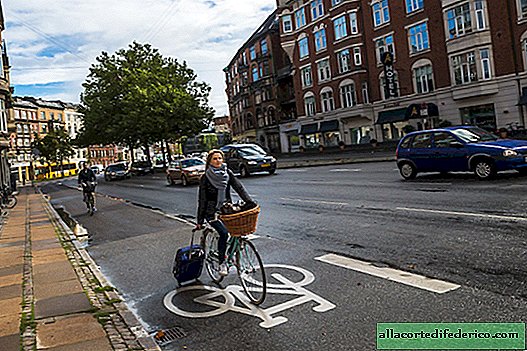It’s difficult with the Germans: how not to lose your mind by moving from Kiev to a small German city
All countries, as well as people, are completely different, unique, there is not one similar to another. I always want to learn something new and interesting about the life of people in them. TravelAsk decided to please you with live interviews with subscribers who tell wonderful stories about their adventures, about the difficulties that they had to face in other states.
Today is our story about Irina, who, together with her husband and daughter, decided to go live in Germany. Moving is always not easy. Find out how it was!

- My husband and I were born and raised in Kiev, in a metropolis, where life was very comfortable, with the exception of traffic jams, and where you could get almost any service or thing at any time. Once I remembered that my mother in the 90s wanted to go with her whole family to Germany. This was possible since my grandmother was German. Then this idea was rejected, but my husband and I thought that if there is such an opportunity, why not take advantage of it while we are young and full of enthusiasm. We both love adventure and believe that chances should be used so that you don’t regret what was done. Moreover, our whole family remained in Kiev and we understood that at any moment we can return, bridges are not burned.

Yes, and I must also say that we have a little daughter Evelina. At the time of the move, she was 2.5 years old. We moved as "late settlers" - people with German roots, whose grandparents or even earlier German ancestors somehow found themselves on the territory of the countries of the former USSR. About 25 years ago, Germany began to invite the descendants of such Germans to return to their historical homeland. In general, we ended up in Bavaria - the richest and most prosperous land in southern Germany, in a large city by German standards.
- What delays did you encounter when moving?
- With the help of a friend, we quickly found a translator specializing in the translation of the necessary documents and very well versed in the legal part. He was engaged in helping people like us prepare a package of necessary documents for emigration. We had all the necessary papers, so no problems arose with this. It remained to attach to the package a certificate of German language proficiency at level B1. I restored my knowledge of the language to this level in a few months, and we immediately sent all the documents. And after about 3-4 months we received a positive response, an invitation to come to Germany and stay there to live.

- What were the main difficulties awaiting you (language learning, work permits and other details important for a comfortable life in Germany)? Perhaps it was difficult to foresee something in advance.
- When you arrive as a PP (late migrant), the state gives time to recover - to learn a language, solve the problem of education, find housing, etc. It is impossible to find a normal job in Germany without knowledge of German at a very good level (B2 at least). The Germans are very reverent and jealous of their native language. You may have a superb education, fluency in English and many other merits, but without German you are nobody here. You can be a doctor of sciences and wash floors in a supermarket without knowing the language.
As a PP, we almost immediately received the citizenship of Germany and the European Union, therefore, with everything else (work permits, benefits, etc. privileges), there were no troubles. The only difficulty, and it is characteristic only for the Bavarian region - it is extremely difficult to find housing here. Demand exceeds supply by a factor of several tens of times when it comes to Munich and its environs.


- How did you have to change your habits with moving to Germany?
- The first thing that many emigrants from the CIS countries will probably notice is the separation of garbage. Mandatory. Fines are issued in the blink of an eye. The Germans are literally obsessed with protecting and clean the environment. Of the most sensitive changes in everyday life: living in Kiev several times a week we went to cafes and restaurants to enjoy our favorite dishes or just good coffee. My husband and I are gourmets and gastro-gatherings - an integral part of our lives. In Germany, delicious food is very tight. We tried to love German cuisine, honestly, but could not. As a result, instead of German establishments, which are prepared, to put it mildly, for an amateur, we discovered city markets, which are often operated by Greeks and Italians, and there are tables here to sit like in a cafe. In short, no matter how strange it may sound, but, having moved to Germany, we completely switched to Mediterranean cuisine. And they began to cook it at home, buying products from the same Greeks and Italians.

And the third, a very painful change for me as a girl personally - in Germany, as, however, in many Western countries, there is no culture of personal care. This is not about basic hygiene, of course. I'm talking about the beauty industry, which is in disastrous condition here. The fact that for our young ladies how to brush their teeth - manicure, pedicure, haircut, cosmetologist, etc., is worth space money, but it is done in such a way that you want to sob at the sight of the result. Therefore, the basics of manicure have to learn the most, and for everything else to fly to Kiev.
- Is it easy for a child to get used to a new place?
- The younger the child, the easier, of course. It also depends on his personal qualities. Our baby is a born communicator, she can make friends and talk with anyone. At that moment, when we arrived, the most important thing for her was the presence of mom and dad nearby, and she looked at everything else with great interest. In Kiev, she never parted with us even once, but here we had to leave her for a few hours with a German-speaking nanny and then send her to a kindergarten a couple of months after the move. But the system is designed so that for a child everything goes as painlessly as possible. There is a period of adaptation, it lasts several weeks, and at this time, mom or dad are with a nanny or in the garden with a child. He is not left until he meets everyone, gets used to it and begins to feel almost at home there. Then the parents begin to leave, increasing the time of absence from day to day, and in the end everything goes pretty smoothly.
- What can’t you put up with in the habits of the Germans?
- As I said, the Germans are obsessed with ecology. In this regard, many travel by bicycle. The city is dominated by cyclists, they travel from everywhere and signal to you that you give way. Just have time to bounce! I have a negative attitude towards bicycles in busy cities. This is unsafe and very annoying.

Even the Germans are incredibly slow in every way. Service is not working well, bureaucracy is at every turn. Roughly speaking, to screw in a screw somewhere / look at the bank account statement / do anything at all, you need to arrange a meeting in advance (they can make an appointment in a week, or in a month or two), come, discuss everything thoroughly, sign it a bunch of papers.
- What shocked or vice versa pleasantly surprised the Germans?
- There are pluses and minuses. This is not to say that something shocked, rather unpleasantly surprised: the Germans are quite detached, unfriendly, and sometimes very rude, arrogant people. Of course, not all. Depends on a person. But most of them do not want to accept new people in their society. My language teacher, an indigenous Bavarian, told me that their distance was historically determined. There were a couple of very harsh and cruel kings. In the era of their reign, people were forced to become closed and indifferent. And, of course, the consequences of the Second World War greatly affected them.

So, about distance and closeness. For example, every day I take my daughter to kindergarten, where I see other mothers. Faced with me face to face, they might say hello if I do this first, loudly and distinctly. But when they see me on the street or in the supermarket the next day, they will not react at all, even if I greet them. However, I noticed that the representatives of the older generation, the post-war, are often very nice. They are not averse to chatting in the store or on the street, asking where we are from, they are interested in and tell a lot about their lives and Germany. We get to know them thanks to Evelyn, who just greets someone on the street, introduces herself and starts a conversation :)

It was pleasantly surprised that all cities and everything in them is equipped for people with special needs. People with disabilities of varying severity of disease are everywhere: they go shopping, walk in parks, ride trains, sit in restaurants. Sometimes I see people on the streets with oxygen tanks. They, for example, buy products in the market. People with disabilities live a completely full life here.


- When you are in the place of a person living in Germany, is there anything that surprises tourists?
- Tourists from different countries have their own characteristics. But so far I have not seen anything particularly surprising. We ourselves sometimes sometimes feel like tourists :)
- In general, is life in Germany better or worse than in Kiev?
- Life in Kiev was wonderful, and we miss our hometown terribly. But, probably, if everything was much worse here, we would already be back. There are several exclusively household moments that cause discomfort: the terrible Internet, the tasteless food in the establishments, the lack of good cosmetology service and the inability to go shopping on Sunday or on a holiday, because everything (!) Is closed. Other problems seem to be surmountable to me over time, including mental ones. But on the opposite side of the scales - EU citizenship, visa-free entry to most countries of the world, excellent medicine, insurance in many areas. In addition, Bavaria is characterized by exceptional safety and impeccable ecology. And be that as it may, there are often friendly people from various countries who are interesting to communicate with. We have already made acquaintances with very nice Germans, Croats, Italians, Greeks, Armenians and Jews.
Now I can say with confidence that moving to another country (especially one as difficult as Germany) is not a gamble for wimps. This is the most ambitious way out of the comfort zone you can imagine. But if you manage to cope with this, no other event in life can expand your boundaries and horizons, temper your character like this adventure.

Dear readers, if you have interesting travel stories that you would like to share with TravelAsk, we will be happy to hear them and publish them as an interview or story. Just let us know about it by sending an email: [email protected]

















